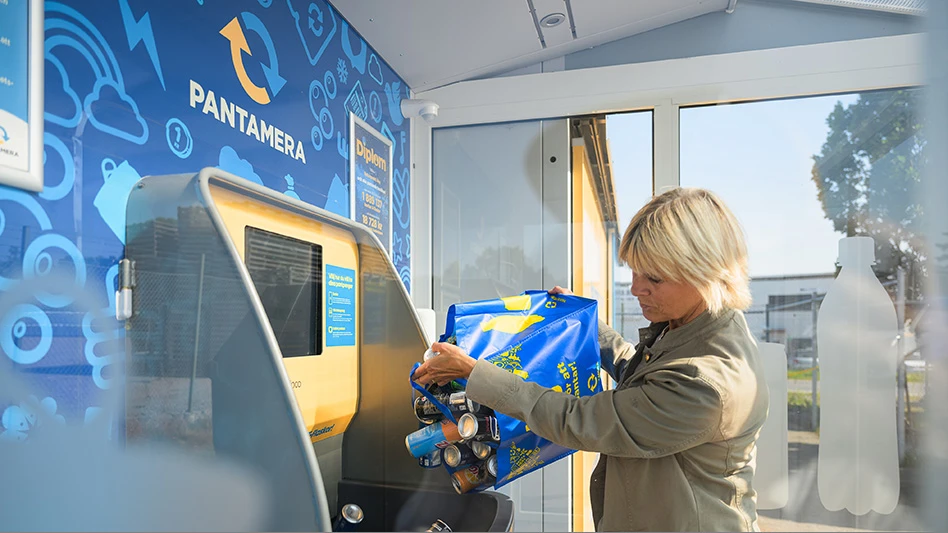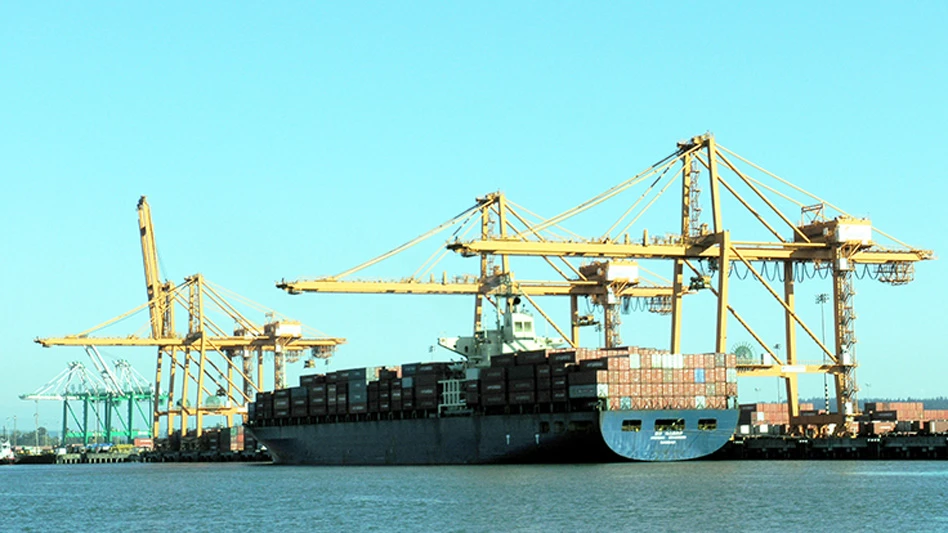In an acquisition that was completed in the summer of 2008, International Paper (IP), Memphis, Tenn., acquired the divisions of Weyerhaeuser Co. responsible for the production of containerboard and for collecting, processing and trading recyclables.
As of 2007, Weyerhaeuser’s recycling operations employed some 700 people and operated 19 recycling facilities in different parts of the country. (See "Accountable for Success" in the January 2007 issue of Recycling Today.)
The merger of these operations into International Paper will involve a number of decisions and management talent from both companies. Among those making the decisions will be Doug Schwartz, formerly a managing director with Weyerhaeuser and now managing director, recycling, for International Paper.
To provide some insight into how the former Weyerhaeuser operations will fit into the IP system, Recycling Today Senior Editor/Internet Editor Dan Sandoval interviewed Schwartz shortly after the finalization of the merger.
Recycling Today (RT): Please explain how the newly formed business will operate?
Doug Schwartz (DS): International Paper acquired Weyerhaeuser’s containerboard and recycling businesses in August of this year. IP did not have a recycling business historically but did have an excellent team that procured recovered paper for the mill system. We are all now within one system that includes our network of 21 recycling facilities across the U.S. and Mexico, our brokerage operations, our procurement functions, including our national accounts business. International Paper is committed to the packaging business, including our recycling operations, and we are quickly identifying synergies both internally and externally that will enhance the IP portfolio.
RT: What synergies will be afforded between the recycling operations and the paper/paperboard mills?
DS: At the mill level, we can combine the knowledge and practices of two successful systems together. Adopting best practices, taking advantage of much improved freight lanes for logistics savings and enabling the legacy IP mills to tap into the commercial side of our recycling business will undoubtedly lead to cost savings and improve our ability to become a better customer to our valued supply base.
RT: Does your company foresee making changes in the way it handles the supply chain in regard to recovered paper?
DS: Our recovered paper supply chain has been a successful method for supplying recovered paper to our internal mills and valued mill customers worldwide for many years. We will continue to service customers worldwide as demand for recovered paper continues to increase. We certainly see synergy opportunities to enhance our supply chain and more competitively deliver recovered fiber to our mill system with the addition of the recycling business.
RT: What is the outlook for the domestic and global paper/paperboard industry?
DS: We continue to see global demand growth of about 4 percent annually for containerboard packaging and believe the business has solid fundamentals domestically as well. The demand for recovered paper domestically and internationally has been quite strong for the past few years. Long-term global demand is expected to be strong with reputable consultants projecting new recovered paper annual demand to average 10 million tons in the next five years. This means that the world’s recycled-content paper mills will require by 2013 a total new volume of recovered paper about equal to all the paper recovered in the U.S. today. If we in the U.S. are going to capitalize on this opportunity, we need to meet and surpass the American Forest & Paper Association goal of 60 percent recovery rate by 2012.
RT: Will the newly formed company focus on developing partnerships with generators of recovered fiber in order to access more material from the waste stream?
DS: IP recycling works with thousands of recovered suppliers, including retailers, schools, governments, office complexes, waste haulers and other recycling companies. As part of IP, we will be working aggressively with all supplier types to present progressive recovery options.
RT: Will there be more of a company-wide approach to sourcing, processing and marketing material, or will mills function on a regional or even plant-by-plant basis?
DS: There will be an International Paper company-wide approach to sourcing, processing and marketing recovered commodities with close coordination at the local, regional and national scales. Our recycling business and the mill fiber sourcing team work together daily to assure that the mills receive the 5 million tons of quality, cost-effective recovered paper they need on an annual basis. We are taking advantage of cost-saving opportunities to reduce in-bound freight costs and shift recovered paper flows between mills in order to work smoothly with our valued suppliers when mill disruptions occur. In addition, we will continue to be a preferred supplier to third-party customers domestically and internationally.
RT: Competition from overseas companies (notably those in China) has been intensifying. What steps can International Paper take to ensure that it grows its business?
DS: Throughout the past 35 years we have built valued customer partnerships worldwide. We have a worldwide reputation for delivering quality recovered commodities to end-use mills in many countries, including and especially China.
The Chinese paper industry’s growth in the last two decades is a phenomenal story as China modernizes and its citizen consumers seek more paper products. We expect this trend will continue, not just in China but throughout Asia, with particular emphasis in India as well.
We will continue to explore opportunities to increase sales into the Asian markets. Because of International Paper’s global presence and the fact that we have recycling employees physically located in various countries throughout the world, including in China, we have the opportunity to offer recycling solutions to many companies in Asia and around the world.
RT: Can you talk about innovations that can spur growth in the paper/paperboard industry?
DS: One of the great things about the packaging industry is that the corrugated box remains the most cost-effective, preferred method of shipping goods from place to place.
With the continued growth of online retailers, use of corrugated packaging will be critical to delivering products to consumers.
In addition, ongoing product innovation is making corrugated packaging a viable alternative for many more regions, products and industries in mature and emerging economies.
RT: Do you see expansion opportunities for International Paper (either in the form of new plants, more acquisitions or partnerships)?
Sponsored Content
Labor that Works
With 25 years of experience, Leadpoint delivers cost-effective workforce solutions tailored to your needs. We handle the recruiting, hiring, training, and onboarding to deliver stable, productive, and safety-focused teams. Our commitment to safety and quality ensures peace of mind with a reliable workforce that helps you achieve your goals.
DS: One of the most exciting things about our industry is that the market opportunity has continued to increase over the course of a couple of decades, unlike many other industries today. By means of this acquisition, as I have noted, we have become the largest paper recycler in North America. While we’ll continue to evaluate options to grow our capabilities and ability to supply the needs of our internal mills and third-party customers, our most immediate priorities are successfully integrating the newly merged business and capitalizing on the many synergy opportunities we see.
RT: On the flip side, is it the approach of IP to focus on core businesses through the sale of non-core assets?
DS: In 2005, International Paper made the clear, strategic choice to focus on uncoated paper and packaging and divested more than $11 billion in non-core businesses, including the bulk of our U.S. forest lands. Today as a more focused company, we believe we have the right customers, capabilities and opportunity to win in paper and packaging. Our recent acquisition of Weyerhaeuser’s packaging business reinforces our commitment to becoming the premier packaging business in the world, and our recycling business is an exciting part of the strategy.
RT: What steps are IP taking to grow its recycling division?
DS: For the coming months we are working at fully integrating the recycling business within the International Paper organization to be certain that everything is working well. It’s a big transition to move an entire organization into a new corporate home, but I will tell you that it is going extremely well. Initial growth will most likely come as a result of pursuing synergistic opportunities within the entire International Paper enterprise. These existing relationships offer fertile ground for the recycling business to grow and to better and more completely serve our customers.
RT: Any additional comments on the company’s direction or the future of IP?
DS: International Paper’s vision is simple: to be the best paper and packaging company in the eyes of our customers, employees, shareholders and the communities where we live and work. As we continue the integration of our newly acquired containerboard, packaging and recycling operations, we see truly exciting opportunities to become the premier global supplier of containerboard and corrugated packaging. While the recycling business is a new component of International Paper, we are already seeing potential benefits not only to our internal mills and supply chain but also to the external customers we serve directly and across the International Paper enterprise.
Recycling Today Senior and Internet Editor Dan Sandoval can be contacted at
dsandoval@gie.net.
Get curated news on YOUR industry.
Enter your email to receive our newsletters.

Explore the October 2008 Issue
Check out more from this issue and find your next story to read.
Latest from Recycling Today
- Nucor expects slimmer profits in early 2025
- CP Group announces new senior vice president
- APR publishes Design Guide in French
- AmSty recorded first sales of PolyRenew Styrene in 2024
- PRE says EU’s plastic recycling industry at a breaking point
- Call2Recycle Canada, Staples Professional expand partnership
- Circular Services breaks ground on north Texas MRF
- Tariff uncertainty results in choppy nonferrous scrap flows







